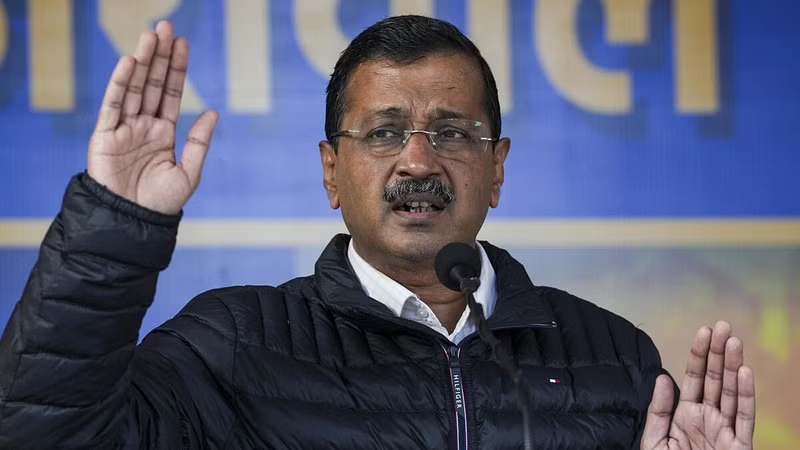By Sushil Kutty
Delhi Chief Minister Atishi finds herself overshadowed by AAP convener Arvind Kejriwal, who previously held the CM position while she served as a minister. Kejriwal has the distinction of having been jailed, a fate that also befell Deputy Chief Minister Manish Sisodia, AAP Rajya Sabha MP Sanjay Singh, and Health Minister Satyender Jain. Although Atishi hasn’t faced such accusations, Kejriwal claims she too will be targeted with fabricated allegations.
Atishi is merely a transitional figure. Kejriwal seeks to reclaim the chief ministership as if it were an easy prize! However, this time around, it may not be as straightforward. The ‘jail-bird’ label could hinder Kejriwal’s chances for a third (or fourth?) consecutive term as CM. Nevertheless, he seems to have a protective ‘kavach’, though its effectiveness in securing AAP’s election victories remains uncertain.
The themes and commitments Kejriwal is emphasizing signal a transformation. He’s transitioned from a position of ‘secularism’ to what many are calling ‘soft-Hindutva’. Such shifts often stem from political uncertainties, and Kejriwal appears less assured than before.
In this round of Delhi elections, doubt seems to plague Kejriwal. The prevailing mood, which leans toward Hindutva, favors Modi and Yogi, compelling Kejriwal to soften his approach.
Contrary to popular belief, Kejriwal aligns himself with Hindu interests and aims to be supportive. Who would have imagined that Kejriwal would make the BJP backtrack on Hindu-related issues?
The AAP is striving to present itself as more Hindu-centric than the notoriously Hindutva-leaning BJP. On New Year’s Eve, Kejriwal proposed an honorarium of Rs 18,000 for Delhi’s Hindu priests and Sikh ‘granthis’, questioning why the BJP had not considered such a move and challenging them to implement it in BJP-ruled states.
Does Delhi’s landscape feature numerous temples, priests, gurdwaras, and ‘granthis’? Ironically, this initiative from Kejriwal emerged while Delhi’s maulanas and maulvis were protesting the non-payment of their “salaries” from the AAP government over the past 18 months. This outreach to Maulanas was part of AAP’s Muslim-centric approach, which the BJP has struggled to imitate.
Currently, the BJP is voicing complaints regarding AAP’s Hindu engagement. Is Kejriwal making the BJP uneasy? Is the BJP comfortable in its Hindutva stance now that Kejriwal has embraced a gentler form of Hindutva? They have powerful Hindutva symbols in leaders like Narendra Modi with his ‘Ek hai toh safe hain’ slogan and Yogi Adityanath with his ‘Batenge toh katenge’ rhetoric.
Yogi Adityanath delivered a dynamic speech in Delhi last week, criticizing the state’s cleanliness: “Under Sheila Dikshit, Delhi was much cleaner,” he declared to an enthusiastic crowd of BJP supporters. “For sanitation and security, come to Ghaziabad and Noida.”
Kejriwal appeared unfazed as he engaged the BJP in a blame game concerning voter roll removals and cash-for-vote allegations, a complaint he raised with the “Param Pujniya” Mohan Bhagwat, who advocates for more moderate Hindu voices to foster “social harmony”, a topic close to his heart.
Will Arvind Kejriwal emerge as the pivotal figure that the RSS Chief envisions, serving as a Hindutva leader without falling into Hindu fanaticism? Kejriwal, a devotee of Hanuman, is unlikely to be the last politician seeking a ‘Shivling’ under any mosque.
Moreover, Hanuman is not associated with Shiva or Krishna but with Lord Ram, and the Ayodhya Ram Mandir is unrelated to the Places of Worship Act, 1991. Has Arvind Kejriwal ever visited the Ayodhya Ram Mandir? Did Delhi’s Chief Minister Atishi offer her respects to Lord Ram in Ayodhya?
Atishi recently accused Delhi Lt. Governor VK Saxena of directing the demolition of temples in Delhi, which Saxena claimed was untrue. Atishi stood firm, showcasing AAP’s soft-Hindutva stance, which often reflects the party’s anxiety as the elections approach.
The seemingly unbeatable AAP in Delhi appears to be grappling with one challenge after another. Whether addressing issues related to Bangladeshis, Rohingyas, or regional disputes, or focusing on water and corruption or initiatives aimed at women, Kejriwal conveys a sense of being trapped and anxious, recognizing that they cannot rely solely on Muslim votes and freebie promises for electoral success!
What if Delhi’s voters mirror those in Maharashtra, Haryana, or the recent Uttar Pradesh by-polls, leaning towards ‘Batenge toh katenge’ and ‘Ek hain to nek hain’? The prevailing sentiment clearly favors Hindutva, especially in Hindi-speaking regions, including Delhi.
This does not guarantee that the BJP expects an effortless victory at all. Despite perceived advantages, the BJP remains uncertain. It is unsure of what surprises Kejriwal may unveil in the elections. If there exists a politician who knows elections better than Kejriwal, that person has yet to step into the spotlight.
Moreover, the voters of Delhi have not abandoned their taste for freebies. If anyone understands the appeal of free services, it is the ‘aam Delhi voter’. The people of Delhi have grown accustomed to Arvind Kejriwal and his pledges, whether perceived as sincere or empty. Though he may present a dual-faced persona, nothing he proclaims seems outrageous to the Delhi electorate, whether discussing anti-corruption efforts or expressing regret for the state of the Yamuna—Kejriwal seems able to navigate nearly any situation unscathed! (IPA Service)


Leave a Reply